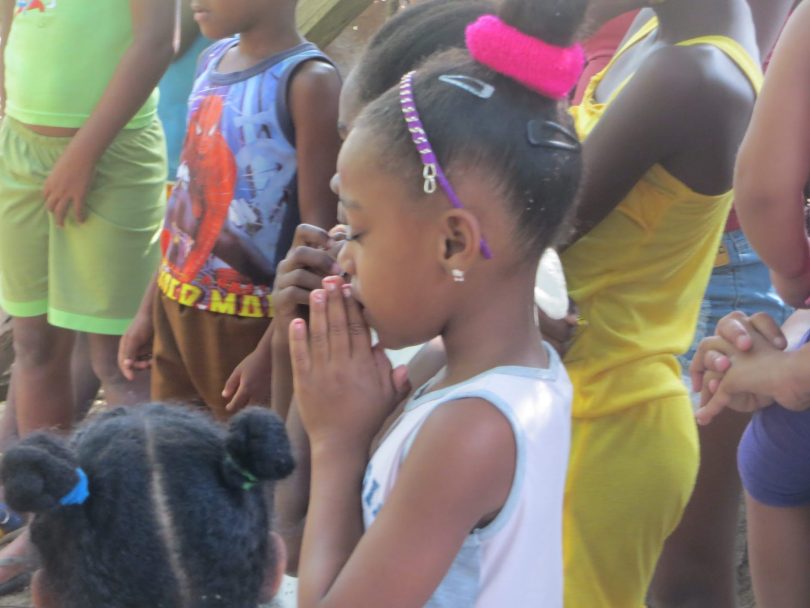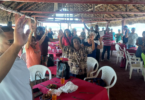Sometimes You Fish, Sometimes You Mend
by Bishop Chris Giesler
Preaching Text: Mark 1:29-39
Biblical scholars often point out that one of Mark’s favorite words is “immediately.” As such, Mark’s Gospel is known for its brevity and its fast pace. For example, our Gospel text for this week is still in the first chapter, but look at what has happened so far.
-
- John the Baptist announces Jesus’ arrival and Baptizes him
- Jesus is immediately driven into the wilderness for what becomes his temptation experience.
- Jesus begins his Galilean ministry, saying, “The kingdom of God is drawing near.”
- Jesus calls his first disciples, Andrew and Peter, as they are casting their nets into the sea and James and John as they are mending their nets.
- Jesus heals the man with an unclean spirit.
- And now, in this week’s passage:
- Jesus heals Peter’s mother-in-law.
- The whole town then shows up at Peter and Andrew’s front door, bringing folks who need to be healed.
- Early the next morning, after a time of prayer, Jesus heads out on a preaching tour in the region.
How is that for a fast and furious start?
Reading today’s text, imagine in your mind the pandemonium at Andrew and Peter’s home that evening. Here is how Mark describes the scene:
“That evening, at sundown, they brought to him all who were sick or possessed with demons. And the whole city was gathered around the door. And he cured many who were sick with various diseases, and cast out many demons; and he would not permit the demons to speak, because they knew him.”
Capernaum was no bustling city like Jerusalem, but it was a decent-sized little town. Today, the town’s ruins show that it was a strip of land about a mile long on the shores of the Sea of Galilee and was located just off one of the leading trading routes. It was known mainly as a fishing village, full of families like those from which Andrew and Peter and James and John had come.
Following along in Mark’s account, I can picture that after the crowds begin to dissipate, things in the home quiet down, and people finally start getting to sleep. Then, early the next morning, while it was still dark, Jesus awakened first; he stepped over the sleeping bodies elsewhere on the floor and quietly slipped out the door through which so many people were healed the night before. He then makes his way out to a deserted place to pray, meditate, and catch his breath.
As Jesus’ new disciples begin to awaken, they find that he is missing and begin a frantic search out into the countryside. When they find Jesus, they beg him to return home, saying, “Everyone is searching for you!”
But rather than return to the familiar, Jesus tells them that while they could do a lot of good back in Capernaum, there is much more to be done. Jesus says: Let us go on to the neighboring towns, so that I may proclaim the message there also; for that is what I came out to do.” Can you hear the sense of clarity that Jesus has here?
What we need to observe here is the careful balance in Jesus’ life. This is the balance between serving and praying. The balance between service and discernment. A balance between action and contemplation.
Let’s look back just a few verses in Mark’s first chapter to where Jesus called Andrew and Peter, then James and John. What were they doing when Jesus approached them? Peter and Andrew were casting their nets into the sea while James and John were mending their nets. If fishermen spend all of their time fishing and not mending, their nets start to form large holes, and soon after that, they are not very good fishermen. Sometimes fishermen fish. At other times, they mend their nets.
In a spiritual sense, Jesus was doing the same thing. One day, he is casting out demons, preaching, and healing souls. The next morning he is praying, discerning, and finding balance. Perhaps we need to do the same thing. We, too, need to look at our lives, examine what we are doing, and ponder whether or not we are keeping ourselves from the best and most important thing that might be next. Is what we did yesterday the best thing to do tomorrow? We will only know if we find that balance between doing and praying, action and contemplation. This is a call to continual mission discernment.
But how do we do that?
- Listen to our hearts. Do we take time to contemplate what makes us most happy? What brings us meaning? Where do we find the greatest sense of satisfaction?
- We listen to others. Where are we affirmed? Where do we often find people saying thank you to us? When we do our best for God, it often touches people’s lives.
- And finally, the most important thing is to take time to be alone to be with God in prayer. And by prayer, I don’t mean us doing all the talking and verbalizing the things we want God to be doing for us. This is a time to ask God what we most need to be doing. This is where I find praying the Daily Texts are most helpful. As I prayerfully consider the texts for the day, I am asking what God is saying in them. How is God speaking? Not just for one given day, but where each day’s texts can build on the next. The takes time! But it is mending time!
All of this frantic work that Jesus has been doing has been his effort at fishing. But now in this time of prayer, he is mending his soul and readying himself for the next fishing expedition.
If all we are doing is 1,000 good things and not mending our souls, then we might be missing the next best thing to which God is calling us.







